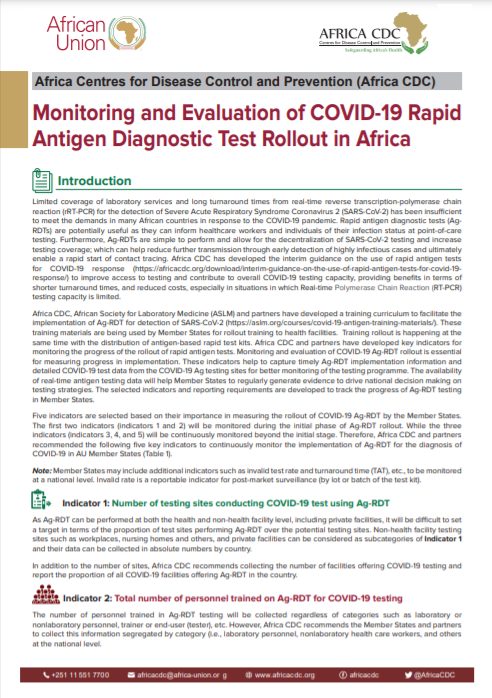Limited coverage of laboratory services and long turnaround times from real-time reverse transcription-polymerase chain reaction (rRT-PCR) for the detection of Severe Acute Respiratory Syndrome Coronavirus 2 (SARS-CoV-2) has been insufficient to meet the demands in many African countries in response to the COVID-19 pandemic. Rapid antigen diagnostic tests (AgRDTs) are potentially useful as they can inform healthcare workers and individuals of their infection status at point-of-care testing. Furthermore, Ag-RDTs are simple to perform and allow for the decentralization of SARS-CoV-2 testing and increase testing coverage; which can help reduce further transmission through early detection of highly infectious cases and ultimately enable a rapid start of contact tracing. Africa CDC has developed the interim guidance on the use of rapid antigen tests for COVID-19 response (https://africacdc.org/download/interim-guidance-on-the-use-of-rapid-antigen-tests-for-covid-19-response/) to improve access to testing and contribute to overall COVID-19 testing capacity, providing benefits in terms of shorter turnaround times, and reduced costs, especially in situations in which Real-time Polymerase Chain Reaction (RT-PCR) testing capacity is limited.
Africa CDC, African Society for Laboratory Medicine (ASLM) and partners have developed a training curriculum to facilitate the implementation of Ag-RDT for detection of SARS-CoV-2 (https://aslm.org/courses/covid-19-antigen-training-materials/). These training materials are being used by Member States for rollout training to health facilities. Training rollout is happening at the same time with the distribution of antigen-based rapid test kits. Africa CDC and partners have developed key indicators for monitoring the progress of the rollout of rapid antigen tests. Monitoring and evaluation of COVID-19 Ag-RDT rollout is essential for measuring progress in implementation. These indicators help to capture timely Ag-RDT implementation information and detailed COVID-19 test data from the COVID-19 Ag testing sites for better monitoring of the testing programme. The availability of real-time antigen testing data will help Member States to regularly generate evidence to drive national decision making on testing strategies. The selected indicators and reporting requirements are developed to track the progress of Ag-RDT testing in Member States.
